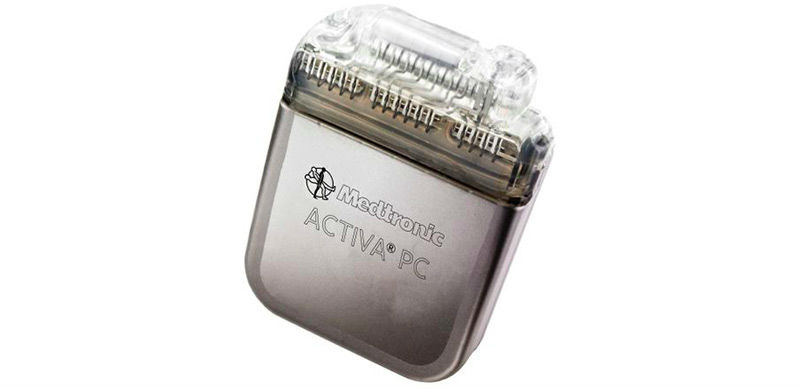
Medtronic’s ACTIVA PC deep brain stimulation
Medtronic plc announced U.S. Food and Drug Administration (FDA) approval of Medtronic Deep Brain Stimulation (DBS) Therapy for use in people with Parkinson’s disease of at least four years duration and with recent onset of motor complications, or motor complications of longer-standing duration that are not adequately controlled with medication. In 2002, the FDA initially approved Medtronic DBS Therapy for use in patients with advanced Parkinson’s disease. Medtronic DBS has demonstrated improvement in motor complications, quality of life, activities of daily living and reduction in medication usage in individuals with Parkinson’s disease.1
Motor complications caused by the disease and/or as a side effect of levodopa result in great social and psychological disability.2 Interference with activities of daily living is often severe and the cost of treatment and care increases along with deterioration of quality of life for patients and their caregivers.2 Thirty-seven percent of people with Parkinson’s retire earlier than those without the disease, retiring an average of six years earlier because of the disease.3 The economic impact of Parkinson’s disease is at least $14.4 billion a year in the United States and it is estimated that the prevalence of the disease will more than double in the United States by the year 2040.4
“Strong clinical evidence demonstrates that, when compared to the best medical treatment alone, Medtronic DBS Therapy offers Parkinson’s patients with recent onset of motor fluctuations and dyskinesias not adequately controlled with medication a higher likelihood of symptom improvement. Historically, the therapy has often not been considered until symptoms have had a significant impact on quality of life,” said Mahlon DeLong, M.D., the W. P. Timmie professor of neurology at Emory University School of Medicine. “This decision by the FDA is significant in that Medtronic DBS Therapy may be considered before the symptoms and complications of disease become severe. Parkinson’s patients should be referred to an experienced DBS multidisciplinary center for a comprehensive evaluation of possible Medtronic DBS therapy. For patients who are still functioning socially and able to work, this may translate into improved quality of life and an overall reduction of the burden of disease.”
This recent approval by the FDA was based on data from the EARLYSTIM clinical study, published in the New England Journal of Medicine in 2013, which found that patients treated with Medtronic DBS Therapy and best medical therapy (BMT) reported a mean improvement of 26 percent in their disease-related quality of life at two years, compared to a one percent decline in patients treated with BMT alone.5 In a study of patients with longer-standing motor complications, DBS patients’ quality of life improved 20 percent from baseline to six months compared to no improvement in the patients treated with BMT alone.1
“Parkinson’s disease is progressive, and as a result a patient’s quality of life will deteriorate over time. This approval is important because it expands the therapeutic window when patients can benefit from DBS,” said Lothar Krinke, Ph.D., vice president and general manager of the Brain Modulation business, which is part of the Restorative Therapies Group at Medtronic. “Medtronic’s goal is to advance medical care and deliver the best possible patient outcomes. DBS is proven to provide long-term benefits and it can now be used sooner in the care continuum, giving patients with recent onset motor complications another option to maintain or restore quality of life.”
Impaired motor complications are associated with decreased quality of life, and the impact is similar for patients with recent onset or longer-standing motor complications.6 In the EARLYSTIM study, 85 percent of patients who received DBS along with BMT had a clinically meaningful improvement compared to only 36 percent in the BMT alone group over 24 months.5 Thirty percent of patients that remained on BMT alone got worse over 24 months compared to only two percent in the DBS group.5 The study also found a 61 percent improvement in levodopa-induced complications, including dyskinesias and motor fluctuations, in participants receiving Medtronic DBS therapy at two years, compared to a 13 percent worsening in those only receiving BMT.5 Additionally, a long-term study of people with advanced Parkinson’s disease who received DBS therapy show benefits at 10 years, despite potential surgical and device-related complications.7
References
1Medtronic DBS Therapy for Parkinson’s Disease and Essential Tremor Clinical Summary, November 1, 2015.
2Boland D, Stacy, M. The economic and quality of life burden associated with Parkinson’s disease: A focus on symptoms. Am J Manag Care. 2012; 18:S168-S175.
3Martikainen, K. K., Luukkaala, T. H. and Marttila, R. J. (2006), Parkinson’s disease and working capacity. Mov. Disord, 21: 2187-2191. doi: 10.1002/mds.21171
4Kowal SL, et al. The Current and Projected Economic Burden of Parkinson’s Disease in the United States. Mov Disord. 2013 Mar 28(3):311-8. doi: 10.1002/mds.25292. Epub 2013 Feb 21.
5Schuepbach WMM, Rau J, Knudsen K, et al. Neurostimulation for Parkinson’s disease with early motor complications. N Engl J Med. February 14, 2013;368:610-22 7.
6Péchevis M, Clarke CE, Vieregge P, et al.; Trial Study Group; Effects of dyskinesias in Parkinson’s disease on quality of life and health-related costs: A prospective European study. Eur J Neurol. 2005; 12(12):956-963.
7Castrioto A, et al. Ten-year outcome of subthalamic stimulation in Parkinson disease: a blinded evaluation. Arch Neurol. 2011 Dec;68(12):1550-6.
Stanford Medicine, American Parkinson’s Disease Association Information and Referral Center; accessed November 29, 2015 http://parkinsons.stanford.edu/about_pd.html




